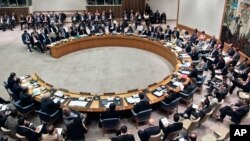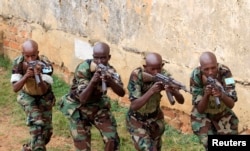UNITED NATIONS —
The U.N. Security Council has unanimously adopted a resolution that will partially lift the decades-old arms embargo against Somalia.
The easing of the embargo which was put in place during the height of Somalia’s collapse in 1992, will allow the government to buy light weapons as it works to strengthen its security forces as it combats al-Shabaab militants.
British Ambassador Mark Lyall Grant, whose delegation drafted the resolution, said it is a good balance between those countries which wanted to see an unrestricted lifting of the embargo and those who felt it was too soon to do so.
“The compromise we have reached, we believe is a good and strong compromise. It suspends the arms embargo on certain categories of weapons, but continues it on many others," Grant said. "And it has put in place a number of additional notifications and monitoring mechanism to ensure that the Security Council can retain effective oversight of what is happening.”
Heavy weaponry, including surface-to-air missiles; large caliber guns, cannons and mortars; and anti-tank guided weapons are among the items still banned under the resolution.
The easing of the arms embargo will go into effect for one year. The British ambassador said if it is abused, the council would take action accordingly.
He added that Somalia still faces “massive” challenges, but the council is trying to mark a further step forward in the progress the government of Somalia has made towards regaining its sovereignty.
“Yes, there are major challenges, but we are now moving to a situation of, if you like, moving away from international trusteeship of the situation in Somalia towards supporting the government’s efforts to address its own problems and its own challenges. And this limited suspension of the arms embargo is an important political symbol of that move,” noted Grant.
The resolution also extends for one year the African Union Mission in Somalia, known as AMISOM, which has been helping government forces stabilize the country and fight al-Qaida-linked militants.
The easing of the embargo which was put in place during the height of Somalia’s collapse in 1992, will allow the government to buy light weapons as it works to strengthen its security forces as it combats al-Shabaab militants.
British Ambassador Mark Lyall Grant, whose delegation drafted the resolution, said it is a good balance between those countries which wanted to see an unrestricted lifting of the embargo and those who felt it was too soon to do so.
“The compromise we have reached, we believe is a good and strong compromise. It suspends the arms embargo on certain categories of weapons, but continues it on many others," Grant said. "And it has put in place a number of additional notifications and monitoring mechanism to ensure that the Security Council can retain effective oversight of what is happening.”
Heavy weaponry, including surface-to-air missiles; large caliber guns, cannons and mortars; and anti-tank guided weapons are among the items still banned under the resolution.
The easing of the arms embargo will go into effect for one year. The British ambassador said if it is abused, the council would take action accordingly.
He added that Somalia still faces “massive” challenges, but the council is trying to mark a further step forward in the progress the government of Somalia has made towards regaining its sovereignty.
“Yes, there are major challenges, but we are now moving to a situation of, if you like, moving away from international trusteeship of the situation in Somalia towards supporting the government’s efforts to address its own problems and its own challenges. And this limited suspension of the arms embargo is an important political symbol of that move,” noted Grant.
The resolution also extends for one year the African Union Mission in Somalia, known as AMISOM, which has been helping government forces stabilize the country and fight al-Qaida-linked militants.





